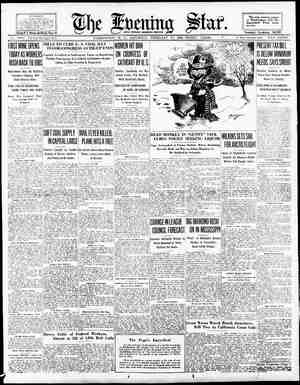The Daily Worker Newspaper, February 13, 1926, Page 9
You have reached the hourly page view limit. Unlock higher limit to our entire archive!
Subscribers enjoy higher page view limit, downloads, and exclusive features.
| \ } The Artis FINE LADY: “Are You Artists Bourgeois or Proletarian?” ARTIST: “Well, We Try to Hover Between the Pocketbook of the Bourgeois and the Soulof the Proletarian.” Fred Ellis, the cartoonist, made this amusing drawing from an idea obtained from the French paper, Le Rire. t Flunkey Communist Party of Soviet Union Changes Its Name HE Russian Communist Party at its recent convention changed its mame to “All-Union Communist Party.” This is not the first but the second time that the party has cham ged its name, In both cases there was a fundamental reason for the change. The party was founded in 1898 and was called the “Social-Democratic La- bor Party of Russia.” Note that the translation of the name has been in- exact. The party was never called “Russian” (Russky), but “of Russia” (Rossiisky}, which meant that it was not a party of Russians only, but a party of all nationalities in Russia. Attempts were made to make it a federative party of naticnalities in ,Russia—for instance the Jewish Bund y~@laimed the right to be in the party ‘ged national federation. There were within the Russian empire some na- tional parties, for instance the Polish and Lithuanian and Finnish parties, of which some took part in the Rus- sian Party conventions thru fraternal delegations. But in principle national! federations never were recognized. After the year 1912 there were actual- ly two social-democratic parties in Russia, the Bolsheviks and the men- sheviks, each of which had its own central committee and separate organ- ization. In January, 1918 the change of name described in the following article "was made. The recent change is the logical consequence of the enlargement of the “Socialist Federative Soviet Republic of Russia” (R. 8. F. S. R.) into the “Union of Socialist Soviet Republics” (in the Russian language the initials are “S. S. S, R.” or in English “U. 8. S. R.”) The change in party name is intended to continue to emphasize the fact that the party is not a party of Russians, but a common central-" ized party of all nationalities in the Soviet Union, The first change was - proposed by Lenin in his now famous April thesis immediately after his arrival to Russia in 1917 He gave the fol lowing reasons for it: must emphasize the fact that we stand on the basis of the Communist Manifesto, which has been distorted by the social-demo- crats who have deserted it in two main respects: the workers have no country of their own and in’ regard to the Marxtan theory of the state, The term “socialdemocracy” is in- correct, as Marx has several times pointed out, as for instance in his “Critique of the Gotha Program” in 1875, and Engels in 1894, It is true that we strive toward socialism, but this must gradually pass over in- to Communism. The word “democ- racy” in our party name is also in- correct in the scientific sonse. De- mocracy is a form ot Me state and we are opposed to the state. Marx- ism differs from anarchism in recog- nizing the necessity of the state in{ the period of the transition, but this will not be a bourgeois state, but such as the Paris Commune and the Soviet of 1905 and 1917. Marx and Engels consented to what they knew was an incorrect, opportunist expression, be- cause history at that time put on the order of the day gradual organizational and educational work. We must also take into account the peculiarity of the present period. We should not imitate the deplorable “Marxzians” about whom Marx said: “I sowed dragon’s teeth and reaped fleas.” Now, when the proketarian revolution begins, the majority of the “social- democratic” leaders have betrayed socialism, and deceived the masses, Should we in such a situation appear as “also social-democrats”? We aim to refashion the world. We aim to make an end of the imperial- ist war, in which hundreds of millions of men are engaged, in which hun- dreds and again hundreds of billions of capital are involved, which cannot end with a really democratic peace without a proletarian revolution, the most stupendous in the history of mankind. And in such a situation, we ourselves are showing fear. We want to keep on wearing the “dear” dirty shirt which \we are “accustomed to,” as the comrades say about the old name. It is time to threw away the dirty shirt and ft is time to put on cleaa clothes, Song of the Fleecers in China By Felix Uotila. L we had it all on China, When we got the “Chinks” to work; We reaped up “dough”—kind-a, And our slaves would never shirk, But sweating thru the day till dusk. They worked in hell and musk, Rotten were their wages : For any common man, But “Chinks” are easy for us And the troubling ones we'd “can.” But ah those Red-blood Russians _ ‘They know too god-damned much, They're telling all our slaves the truth, Their cries we cannot hush, Yet there’s the high Locarno pact We might pay Red Russia back, Its no use crying,— The Reds have got us pat.



